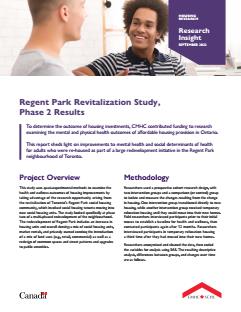To determine the outcome of housing investments, CMHC provided research funding to examine the mental and physical health outcomes of affordable housing provision in Ontario.
This study looks at improvements to mental health and social determinants of health for adults who were re-housed as part of a large redevelopment initiative. This research was done in Toronto’s Regent Park neighbourhood.
The study focused on phase 2 of a multi-phased redevelopment of the neighbourhood. The redevelopment included an increase in housing units and overall density and a mix of social housing units, market rentals and privately owned condos. It also added mixed-use buildings, green spaces and community amenities.
Researchers surveyed 2 intervention groups and a control group to isolate and measure the changes resulting from the change in housing.
- One intervention group transitioned directly to new housing.
- Another intervention group received temporary relocation housing until they could move into their new homes.
Field researchers interviewed participants prior to their initial moves to establish a baseline for health and wellness, then contacted participants again after 12 months. Researchers interviewed participants in temporary relocation housing a third time after they had moved into their new homes.
The research revealed 3 key outcomes to health and wellness of participants as a result of the housing intervention.
- At the first follow-up, direct-to-new group participants saw significant improvements to their perceived stress and depression scores compared to baseline. These changes did not persist at the second follow-up. Researchers did not observe similar changes among the temporary relocation group participants at either follow-up.
- Participants in both the direct-to-new and temporary relocation groups saw significant increases in their housing and neighbourhood satisfaction their new units. For the temporary relocation group, these changes corresponded with their second move – from older public housing units outside Regent Park to brand new units inside Regent Park – but not the first move. For the direct-to-new group participants, who relocated directly into new Regent Park units, these changes persisted over time.
- There were few or no changes in other health outcomes for the intervention groups compared to the control group. The exception was mental health improvements seen for the direct-to-new group.
Get all the details, including the survey results, from the Regent Park Revitalization Study Research Insight.
- Author:
- CMHC
- Document Type:
- Date Published:
- September 22, 2022







 Share via Email
Share via Email
